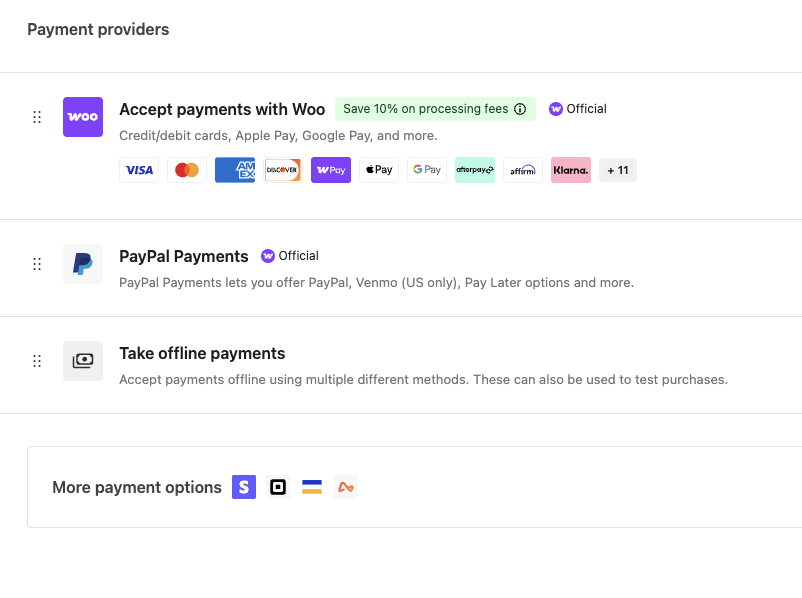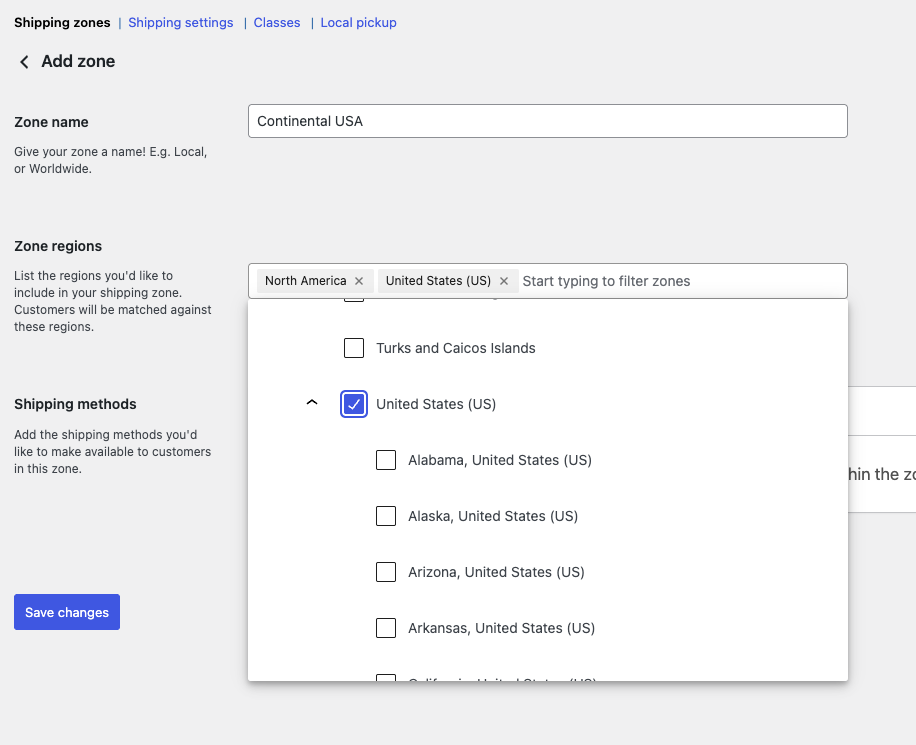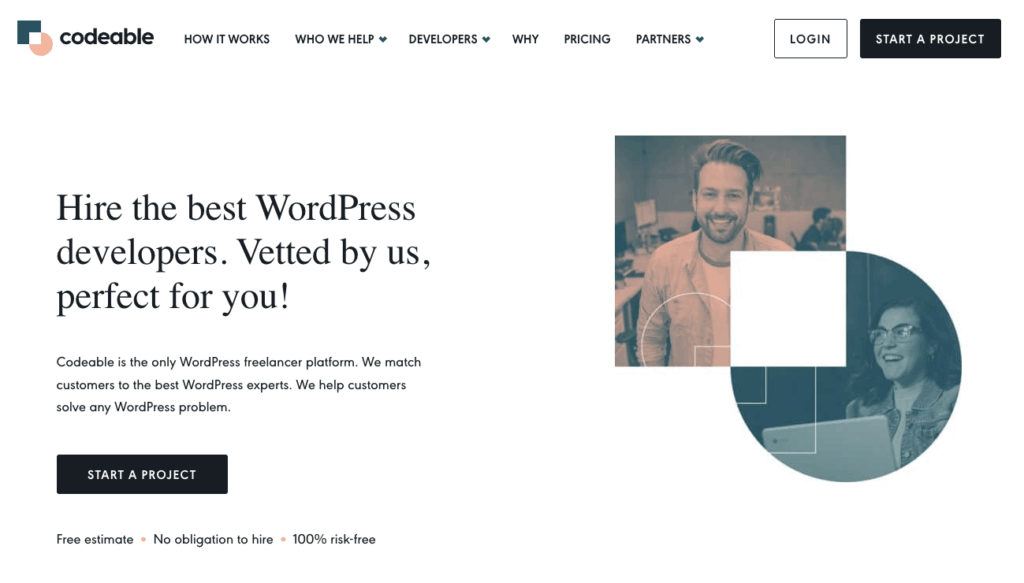Building a complex, dynamic eCommerce site is fundamentally different from building a simple blog. The developer you choose will determine whether your new site becomes a powerful, revenue-generating asset or a costly, bug-filled technical liability.
The WordPress market is saturated with “Assemblers”, i.e., developers who are skilled at configuring pre-built themes and plugins. But a high-performing online store needs an “eCommerce Architect”. This is a specialist who can write original code and build custom, scalable solutions designed to handle complex business logic, secure payments, and strict compliance.
This guide is here to help you tell the difference. We’ll explore the specific technical skills, strategic thinking, and professional practices that separate elite eCommerce specialists from the generalists.

Get matched with the developer
that is perfect fit for your WordPress or WooCommerce needs.
Start a project
The two developer profiles: assembler vs. architect
The most critical mistake a business can make is assuming all WordPress developers are the same. The truth is, the skills needed to build a simple blog are worlds apart from those required to build a high-performing online store. Let’s talk about the two fundamental profiles: the “Assembler” and the “eCommerce Architect”, in more detail.
Profile 1: the “assembler” (plugin configurator)
The “Assembler,” or Plugin Configurator, is the most common type of developer you’ll find in the WordPress ecosystem. This individual’s main skill is using and configuring pre-existing tools to piece together a website.
Their process is predictable:
- They often start with a heavy, multi-purpose “premium” theme like Avada, Divi, or Enfold.
- When you ask for a new feature, such as a contact form or an event calendar, their first and only question is, “Is there a plugin for that?“
- They then find, install, and configure a plugin to get the job done.
This approach can be fast and affordable for simple, static brochure sites. For an eCommerce store, however, this method is a serious liability. It creates what experts call a cobbled-together system. Your site becomes a fragile house of cards, built from dozens of different plugins by different authors. This inevitably leads to performance issues, limited customization options, and a final product that is too slow, too buggy, or too confusing.
Even worse, when an error eventually occurs, this type of developer often lacks sufficient knowledge of the code to determine and address the root cause. They can change the tires, but they can’t diagnose a problem with the engine.
Profile 2: the “eCommerce architect” (custom developer)
The “eCommerce Architect,” or Custom Developer, is a completely different type of professional. This developer’s primary skillset is in writing original code and building bespoke solutions.
When an Architect gets a new feature request, their first question isn’t about finding a plugin. Instead, they ask, “What is the most efficient, secure, and scalable way to build this?”.
This specialist builds and customizes plugins and themes, rather than just installing them. They create lean, purpose-driven solutions tailored to unique business needs. Instead of starting with a bloated theme, they will build a custom, lightweight theme from scratch, containing only the code necessary for your project.
An Architect understands that your online store is a complex, dynamic piece of business-critical infrastructure and develops a leaner, faster-loading website that is built to scale. The upfront cost of hiring a dedicated WooCommerce expert may be higher, but the result is a secure, high-performing asset designed with future growth in mind.
| Characteristic | Profile 1: The “Assembler” | Profile 2: The “eCommerce Architect” |
| Primary value | Speed & configuration. | Customization & performance. |
| Core tools | Pre-built themes, page builders, 30+ plugins. | Custom-coded themes (from scratch), custom plugins, core APIs. |
| Approach to a new feature | Is there a plugin for that? | What is the most efficient way to build this? |
| Resulting site | Bloated website, often due to multipurpose themes and plugins. | Leaner, faster-loading website, built only with what’s necessary. |
| Scalability | Limited customization options. | Designed with future growth in mind. |
| Business risk | High long-term technical debt; unscalable. | Higher upfront cost; high long-term asset value. |
Core technical competencies for eCommerce
Now that we’ve established the critical difference between developer profiles, let’s look at the specific technical skills that define a true eCommerce expert. These competencies are the hiring manager’s checklist for what a candidate must know to build a successful, scalable online store.
WordPress core mastery beyond themes
A true specialist’s knowledge goes far beyond the admin dashboard. They must have a deep understanding of the platform and know how to interact with it professionally and safely.
- Understanding hooks (actions and filters). Hooks are the central nervous system of WordPress. They are a system of triggers and ports that allow a developer to modify data or execute custom code at specific moments, without hacking the core files. This is the single most effective litmus test. A generalist may use plugins built with hooks, but an expert developer knows how to build those plugins.
- Proficiency with the WordPress REST API. A WooCommerce expert must be familiar with the core REST API. This is the interface that allows the WordPress backend to communicate with other applications, from mobile apps to third-party dashboards. It is the foundational technology for headless architectures.
- Experience building custom Gutenberg blocks for the new editor. This shows they are current with WordPress’s modern standards and can create a truly custom, intuitive editing experience for the client, rather than relying on clunky, third-party page builders.
WooCommerce architectural fluency
An online store is much more complex than a standard WordPress site. A general WordPress developer, even a good one, may lack deep WooCommerce expertise. You need a specialist who understands WooCommerce’s unique architecture.
Mastery of the template override system
A WooCommerce expert’s primary goal is to build a site that is “upgrade-safe”. This means that when the core WooCommerce plugin is updated, none of the custom designs or features break. They very rarely edit the core plugin files. Instead, they use the template override system, copying a template file into a child theme folder to ensure that WooCommerce loads the custom file instead of the default.
Email customization with hooks
Transactional emails (like “Order complete”) are a critical part of the customer journey. An experienced senior developer will utilize hooks to add conditional and dynamic content. For example, they can use a hook to check which product was purchased and, if it was a specific software, automatically inject a “purchase note” with a link to the user guide directly into that email.
Understanding payment gateway architecture
This is one of the highest-stakes decisions in the build. An expert developer acts as a strategic consultant, helping you understand the trade-offs.

- Hosted gateways redirect customers off-site to complete the payment. This is simpler and massively reduces PCI compliance scope.
- API-driven gateways keep the customer on-site for a seamless ordering process, which is vital for maximizing conversions. An expert understands this trade-off between user experience and risk.
Architecting complex shipping and tax logic
For many businesses, shipping logic is the most complex part of the build. The developer must be an expert at translating real-world fulfillment rules into WooCommerce’s framework. This requires mastering how the three components interact:
- Shipping zones: The geographic regions you ship to (e.g., “Continental US”).
- Shipping methods: The rules and rates within a zone (e.g., “Flat Rate,” “Free Shipping”).
- Shipping classes: Groups used to classify products (e.g., “Bulky,” “Perishable”).

A WooCommerce specialist’s skill is combining these to model complex business logic, like: “Offer ‘$10 Flat Rate’ (Method) for the ‘Continental US’ (Zone), except for products in the ‘Bulky’ (Class) category, which always have a ‘$100 Freight Surcharge'”.
Proficiency with the WooCommerce REST API
This is what turns a website into a business integration tool. The API allows external applications to “read and write” data like orders, products, and customers. An expert developer uses this to make the website “talk” to other critical systems, including a Third-Party Logistics (3PL) warehouse for fulfillment, an Enterprise Resource Planning (ERP) system for inventory, or a Customer Relationship Manager (CRM) for sales data. This automation can save a company hundreds of hours in manual data entry.
Specialized platform expertise
A true eCommerce specialist understands that WooCommerce, while powerful, is not the best tool for every job. They know when to recommend a more specialized platform to better fit the business model.
- Easy Digital Downloads (EDD). This plugin is the industry standard for selling digital products like software, ebooks, or music. It’s built specifically for managing things like file downloads and software license keys.
- MemberPress. This is a top-tier, all-in-one solution for building complete membership sites. It’s designed specifically for selling online courses, paywalled content, and community access.
An expert’s willingness to recommend these alternatives shows they are focused on your business’s unique requirements, not just trying to force a one-size-fits-all solution.
Performance and security expertise
Beyond building features, an expert eCommerce developer is responsible for architecting a store that is fast, secure, and built for growth. These senior-level skills protect your revenue, prevent catastrophic failures, and create long-term asset value.
Advanced performance optimization
For an online store, speed is a prerequisite for survival. However, optimizing an eCommerce site is far more complex than optimizing a simple blog.
This is the eCommerce performance paradox: standard websites can be made fast with full-page caching, but eCommerce sites, by their nature, cannot.
An expert developer must understand this challenge and know how to:
- Implement selective caching strategies. Dynamic pages like the cart, checkout, and “my account” pages are unique to each user and must be explicitly excluded from caching. Failing to do this can cause a catastrophic security breach, like showing one user’s personal information to another.
- Optimize the database. For a store with thousands of products and orders, the database becomes the bottleneck. A specialist will know how to optimize it by:
- Cleaning out old, expired data that clogs the tables.
- Applying database indexes, which help MySQL find data thousands of times faster.
- Implementing a persistent object cache (using tools like Redis or Memcached). This stores the results of common, complex database queries (like an inventory check) in high-speed memory, preventing the site from crashing during a flash sale.
- Optimize AJAX and Core Web Vitals. The checkout process relies on AJAX to update cart totals or validate zip codes without a full page reload. An expert will optimize these calls to be fast and non-blocking. They will also improve your Google Core Web Vitals for a better user experience and higher search rankings.
- Diagnose backend bottlenecks. A high PageSpeed score is useless if a slow database query brings the site to a grinding halt during your busiest sales event. A specialist knows how to use diagnostic tools to find and fix these hidden backend problems.
Security and PCI compliance
For an online store, a security breach is not an inconvenience; it is an extinction-level event. It destroys customer trust, incurs massive fines, and can lead to legal action. An eCommerce specialist is, by necessity, a security and compliance expert.
This expertise includes:
- A “defense in depth” strategy. A professional goes far beyond just installing a security plugin. They implement a layered security strategy that hardens the application, controls access, and protects the network.
- Application hardening. This involves key steps like disabling the plugin and theme file editor from the admin dashboard, turning off outdated protocols like XML-RPC, and enforcing two-factor authentication (2FA) for all admin accounts.
- Understanding PCI-DSS compliance. This is one of the most high-stakes areas of eCommerce. An expert developer knows the single most important rule of the Payment Card Industry Data Security Standard (PCI-DSS): Never, ever store credit card data on your server.
- Using tokenization and hosted fields. To keep the checkout process smooth and secure, a specialist will use modern payment gateways. These tools use tokenization or hosted fields so that the customer’s sensitive data goes directly to the payment processor and never even touches your server. You get an uninterrupted, on-site user experience without the massive liability.
- Architectural avoidance. The developer’s most important role is to design an accessible solution that reduces your compliance scope from the start. By refusing to build insecure solutions and using compliant tools, they protect you from catastrophic legal and financial liability.
Modern development practices
How a developer builds and deploys code is just as important as the code itself. Expert eCommerce developers don’t just “wing it”; they follow strict, modern processes designed to protect your store from breaking. This professionalism is a non-negotiable test of their skill.
Professional workflow requirements
A true specialist will insist on a professional workflow. They know that working directly on the live site is a massive liability. A professional’s process is all about managing risk and ensuring quality.
Key requirements include:
- Mandatory use of version control. Git is a system that safeguards all code modifications. It allows the developer to track every single change, collaborate with other developers, and, most importantly, instantly roll back to a previous version if a new feature or update breaks the site.
- Insistence on staging environments. This is the single most important part of a safe workflow. A staging site is a private, exact copy of your live production site. All changes, plugin updates, new code, and theme tweaks are deployed to this staging server first. This allows you and the developer to safely test everything without affecting your live customers.
- Refusal to “cowboy code”. A specialist will refuse to work directly on the live site via (S)FTP, even for a “quick fix”. They understand that a 5-minute ad-hoc edit can easily cause a 5-hour, revenue-killing outage. This discipline is the hallmark of a senior professional.
This discipline leads to an inviolable, step-by-step process that ensures stability:
- Local development: The developer builds and tests the new feature on their own computer.
- Push to Git: They save their changes to the central Git repository.
- Deploy to staging: The changes are pushed to the private staging site.
- Client tests/approves: You review the changes on the staging site to confirm everything works perfectly.
- Deploy to production: Only after approval are the changes pushed to your live website.
Strategic SEO implementation
An expert developer understands that search engine optimization (SEO) is a technical implementation, and not just a marketing function. The way they build your site has a direct impact on your traffic and revenue.
They contribute to your SEO in several key technical ways:
- Generating clean, comprehensive XML sitemaps. For a large store, a single sitemap is inefficient. A specialist will configure your site to generate multiple, organized sitemaps (e.g., one for products, one for categories). This helps search engines find and index your new or updated products much faster.
- Implementing Product Schema. This is the developer’s highest-value SEO contribution. A schema is a standardized block of code, invisible to the user, that explicitly tells search engines all about your product, including its name, brand, price, currency, availability, and average star rating.
- Enabling enhanced search snippets. A correctly implemented Product Schema is what gives your store better visibility in Google search results. These snippets dramatically increase your click-through rate, directly driving more qualified traffic and revenue to your store.
- Optimizing site architecture. A good developer ensures the site’s structure is logical, fast, and easy to navigate for both human users and search engine crawlers, which is a foundational part of good SEO.
Vetting framework for hiring
You’re now equipped with the knowledge of what makes an expert eCommerce developer. But how do you find one in a sea of candidates? Based on our years of experience, we’ve developed a simple 3-step framework to help you filter the noise and find the right specialist.
Step 1: The portfolio review
A developer’s portfolio is a take-home test in disguise. You just have to know how to grade it. Use this checklist to quickly spot the difference between a real specialist and a generalist.
| ✅ Green flags (What you want to see) | 🚩 Red flags (What to watch out for) |
| Diversity and complexity. The portfolio showcases complex platforms tailored for different industries, not just 10 sites that appear identical. | Repetition. The portfolio is just 10 variations of the same premium theme or page builder. |
| Custom work explained. The developer explains how they built features, using technical terms, rather than a generic “built a lightweight theme from scratch.” | Plugin reliance. When you ask, “How did you build this?”, the answer is always, “I used a plugin for that.” |
| Business-focused case studies. They articulate the “business goal” and the “technical strategy” used to solve the client’s problem. | Visuals-only focus. The developer only talks about “flashy visuals” and “pixel-perfect” design, not the results or the business impact. |
| Proven scale. There is clear evidence of handling complex integrations, multi-vendor marketplaces, or high-traffic stores. | Simple “Brochure” sites only. The portfolio shows no evidence of handling a real eCommerce site with complex shipping, tax, or payment logic. |
Step 2: The interview
If the portfolio looks good, the next step is the interview. This is where you discover how they think and how they work. In a remote setting, these soft skills are just as important as technical skills. You’re looking for a partner, not just a pair of hands.
| ✅ Green flags (Signs of a professional partner) | 🚩 Red flags (Signs of a future headache) |
| Clear explanations. They can explain complex technical ideas in simple terms, without being condescending or using heavy jargon. | Vague or defensive answers. Communication is unclear, delayed, or they get defensive when you ask questions. |
| Proactive communication. They value regular updates. You should never have to ask, “What’s the status?” | Blaming others. They speak poorly of past clients or blame them for a project’s failure. |
| A problem-solving mindset. They ask “why” you want a feature to understand the business goal, not just take a list of tasks. | A “task-taker” mindset. They just want a feature list and don’t ask questions about your business goals or your customers. |
| Empathy and professionalism. They practice active listening and talk openly about using clear contracts, meeting deadlines, and taking ownership of their work. | Unprofessional behavior. They seem disorganized, are late for calls, or are willing to work without a contract (a huge red flag). |
Step 3: The final check (Spotting the deal-breakers)
The developer’s portfolio looks great, and the interview went well. Before you sign the contract, run through this final checklist of non-negotiable deal-breakers. If you see any of these, it’s a sign to walk away.
| Red flag 🚩 | Why it’s a deal-breaker |
| The “page builder” trap | The developer only knows how to use a page builder. When an error occurs, they won’t have the coding knowledge to find and fix the root cause. |
| Hiring on price alone | This is the most common mistake. A budget developer often lacks the expertise for complex projects, leading to poor performance and higher costs in the long run. |
| No contract | A professional requires a formal agreement. A developer willing to work without one is not a professional and offers you no protection or accountability. |
| Vague on core concepts | If the candidate can’t clearly explain their approach to product customization, security, performance, or PCI compliance, they don’t have the necessary expertise to protect your store. |
Why Codeable is the solution

As you must have realized, finding a true eCommerce specialist requires an extensive and highly technical vetting process. For a non-technical business owner, this can be a difficult, time-consuming, and risky task.
Codeable solves this exact problem.
Our platform is designed to connect you only with elite, pre-vetted WooCommerce experts, filtering out the generalists and plugin configurators from the start.
Before a developer can join our platform, they must pass a rigorous, multi-stage screening process that includes:
- Detailed technical exams.
- In-depth behavioral and communication interviews.
- Live coding tests to prove their real-world problem-solving skills.
- A 90-day trial period to ensure their quality and professionalism meet our high standards.
For you, this means you can stop worrying about catastrophic hiring mistakes. You no longer have to spend weeks sifting through dozens of unqualified candidates, as we’ve already done that work for you.
Our unique “shared workroom” model provides complete transparency. When you post a project, 1-5 recommended experts can review your brief, ensuring you get an accurate scope and a fair estimate. This process is also incredibly fast, letting you accelerate your project timeline without sacrificing quality. Furthermore, a secure escrow system protects both you and the developer, ensuring payments are handled safely and fairly.
Finding the right WooCommerce specialist requires deep technical vetting. Codeable has already done this work, providing you with direct access to developers who are vetted by us, and are perfect for you.
With us, you can rest assured that you’re partnering with a true professional who understands the entire WordPress engine and can help you build, scale, and secure your online business for the future.
If that sounds good, connect with us to share your project requirements!

 Dream It
Dream It

